HOA attorneys refused ADR and a no-cost settlement offer and litigation has continued into 2023
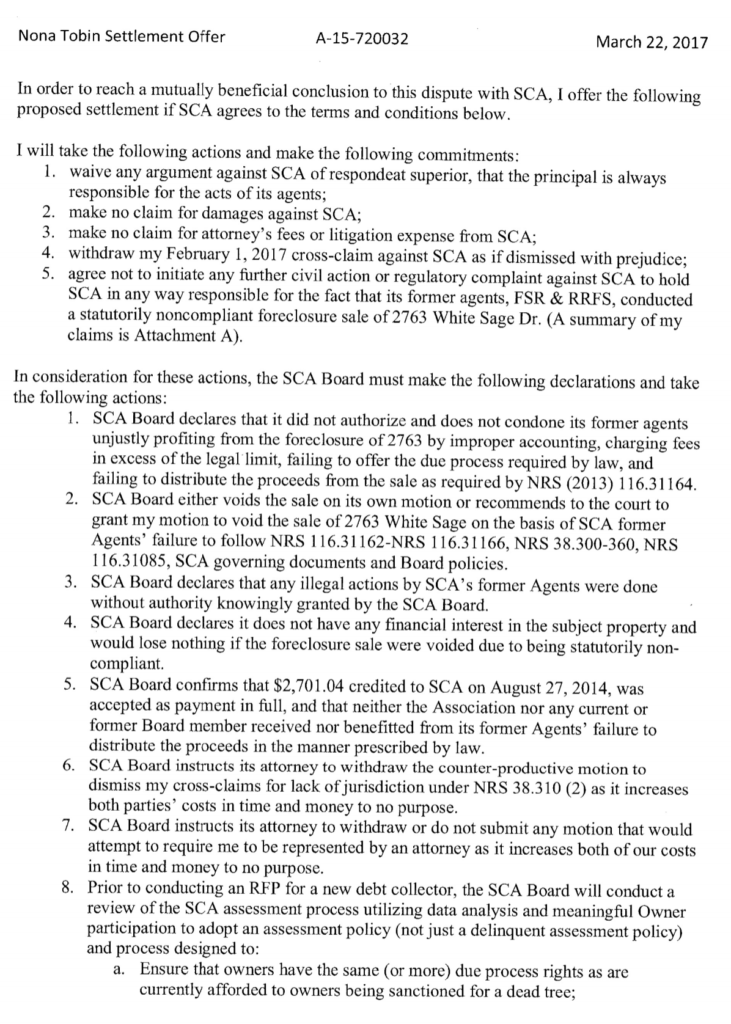
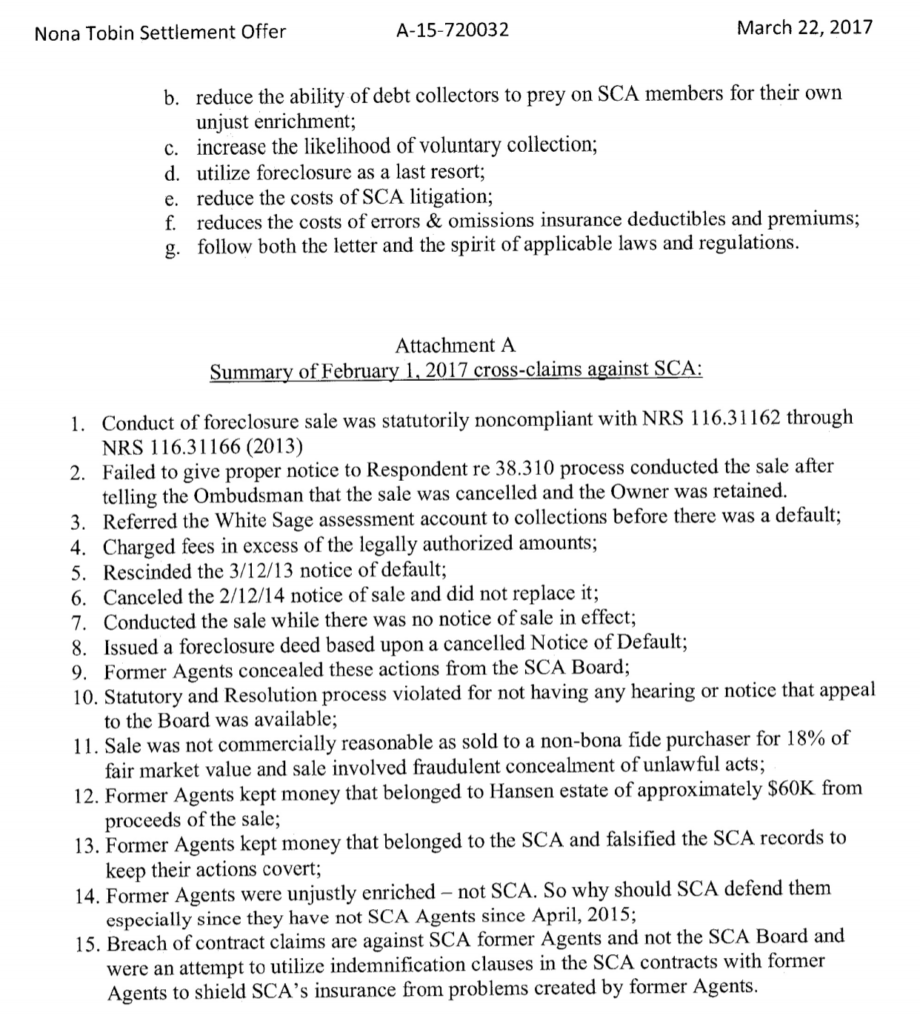
SCA CC&Rs require Alternate Dispute Resolution – but the attorneys blocked it


Owners should ALWAYS come first!
Nevada has long had many HOA homeowner protections built into state law, but speaking from personal experience of living in an HOA where the attorney is also the debt collector and also the CAI lobbyist, the law doesn’t matter because he interprets it to be something other than what the black letter of the law says.
He says the law is what is most favorable to himself and to the other CAI affiliate managers/agents, not they fare in danger because the lobbying organization for the HOA attorneys, managing agents, debt collectors, and other vendors who “service” (in every sense of the term” HOAs, the Community Association Institute (CAI) has been chipping away at homeowner rights and building in rights for HOA agents who are supposed to be fiduciaries.
In 2006, AARP wrote an amicus brief to a case where an HOA prohibited people from posting political signs.
The AARP amicus brief in Committee for a Better Twin Rivers v. Twin Rivers Homeowners Association argues that HOAs may violate the following homeowner rights:
The AARP brief argues that HOAs often have rules that violate these rights. For example, HOAs may have rules that prohibit political speech, that require homeowners to get permission before making changes to their homes, that allow HOAs to access homeowners’ homes without a warrant, that discriminate against certain groups of people, or make it difficult for homeowners to challenge HOA decisions.
The AARP brief argues that homeowners should be aware of their rights and that they should not hesitate to challenge HOA rules that they believe are unfair or unreasonable. The brief also argues that state and federal governments should enact laws that protect the rights of homeowners.
Here are some specific examples of how HOAs may violate homeowner rights:
The AARP brief argues that this model bill of rights would be a valuable tool for protecting the rights of homeowners. The bill of rights would help to ensure that homeowners are treated fairly and that their voices are heard. The bill of rights would also help to promote transparency and accountability in HOAs.
The AARP amicus brief argues that this model bill of rights would be a valuable tool for protecting the rights of homeowners. The bill of rights would help to ensure that homeowners are treated fairly and that their voices are heard. The bill of rights would also help to promote transparency and accountability in HOAs.
by George K. Staropoli, first published 3/11/12
I believe this shows that a tiny group of attorneys and HOA managers have for more than a decade crushed the rights of millions of HOA homeowners by convincing legislators nationwide that they were speaking for the best interests of HOA homeowners when they were really the mouthpiece for the trade association of the HOA managers, attorneys and other agents who “service” the HOAs for their own enrichment.
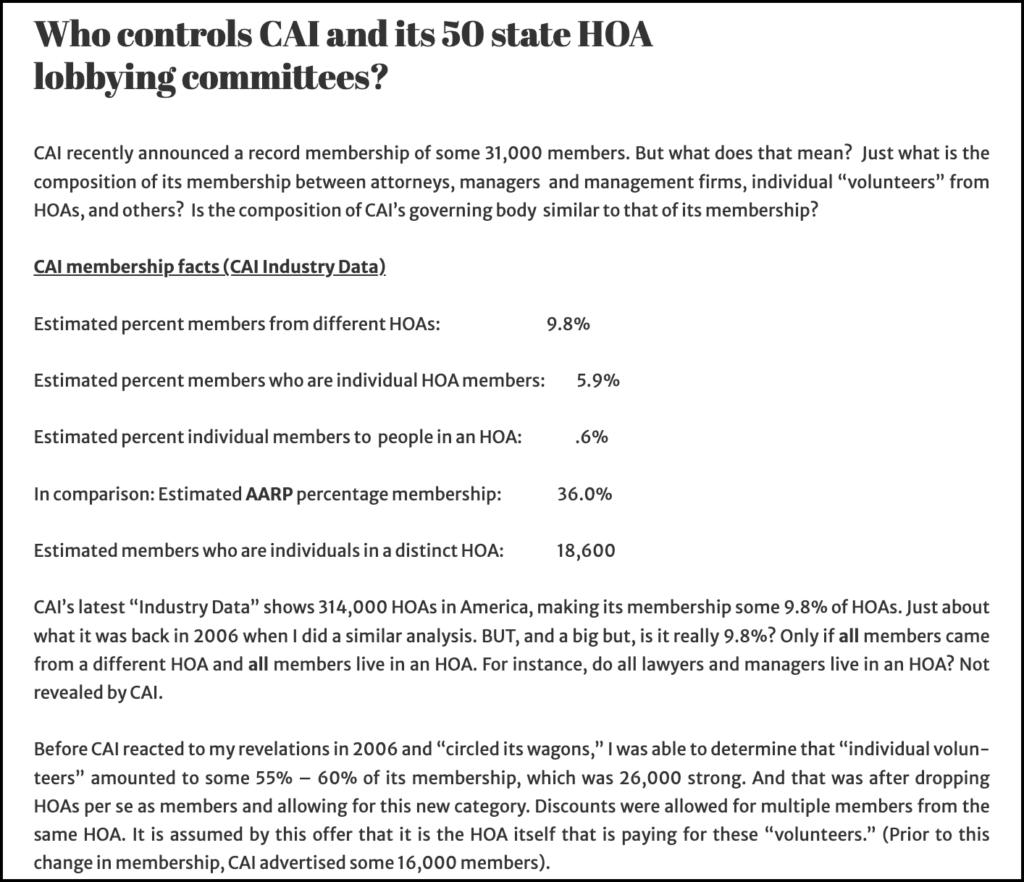
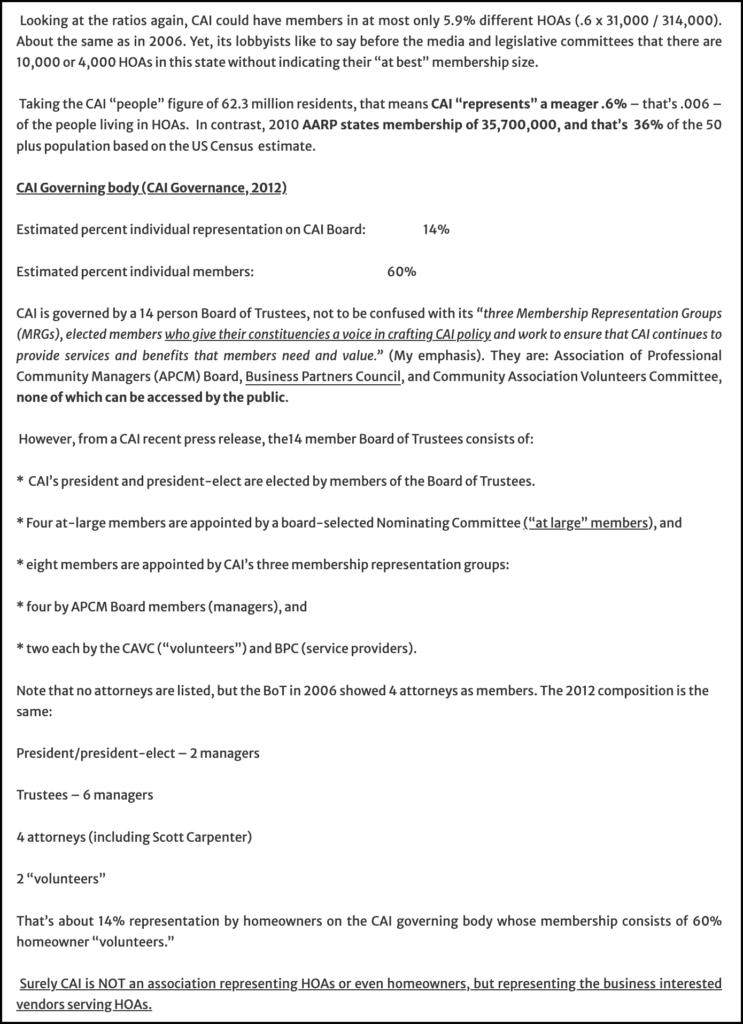

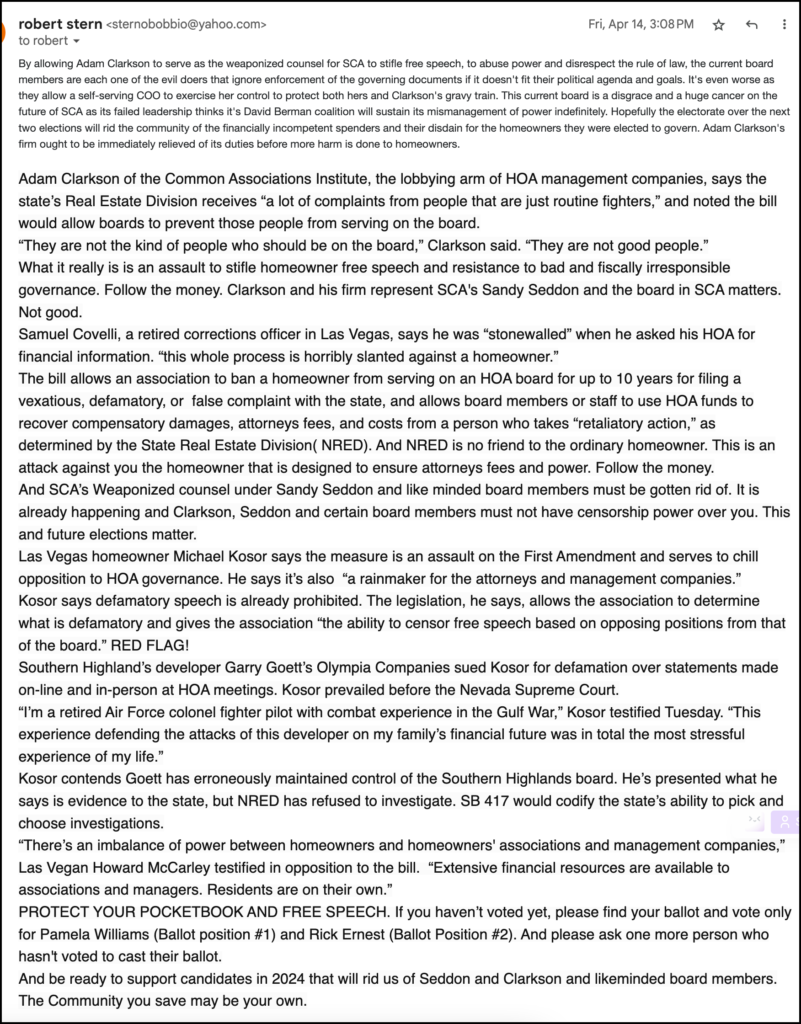
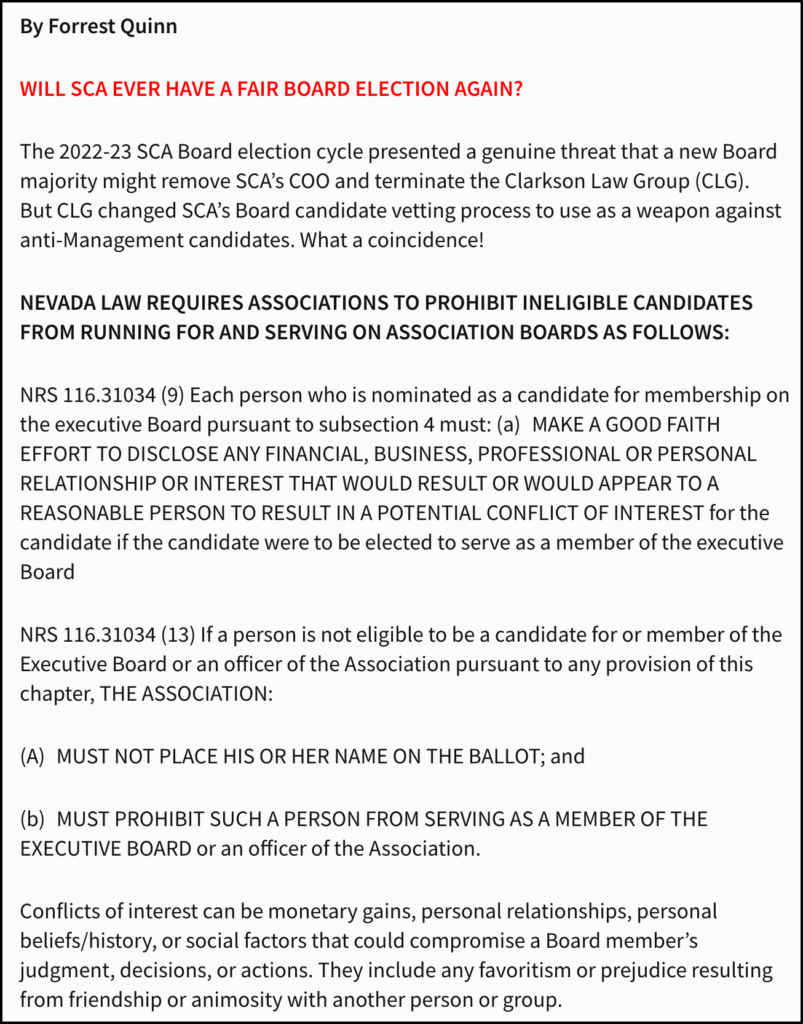
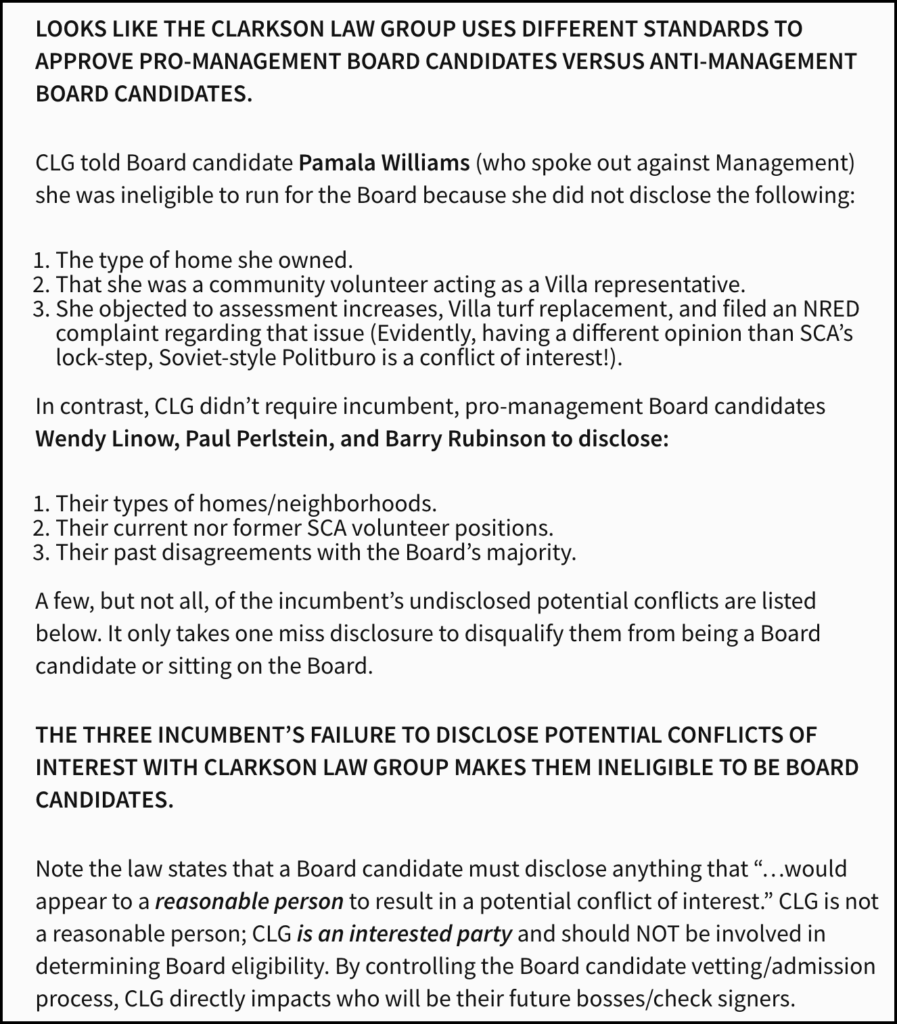
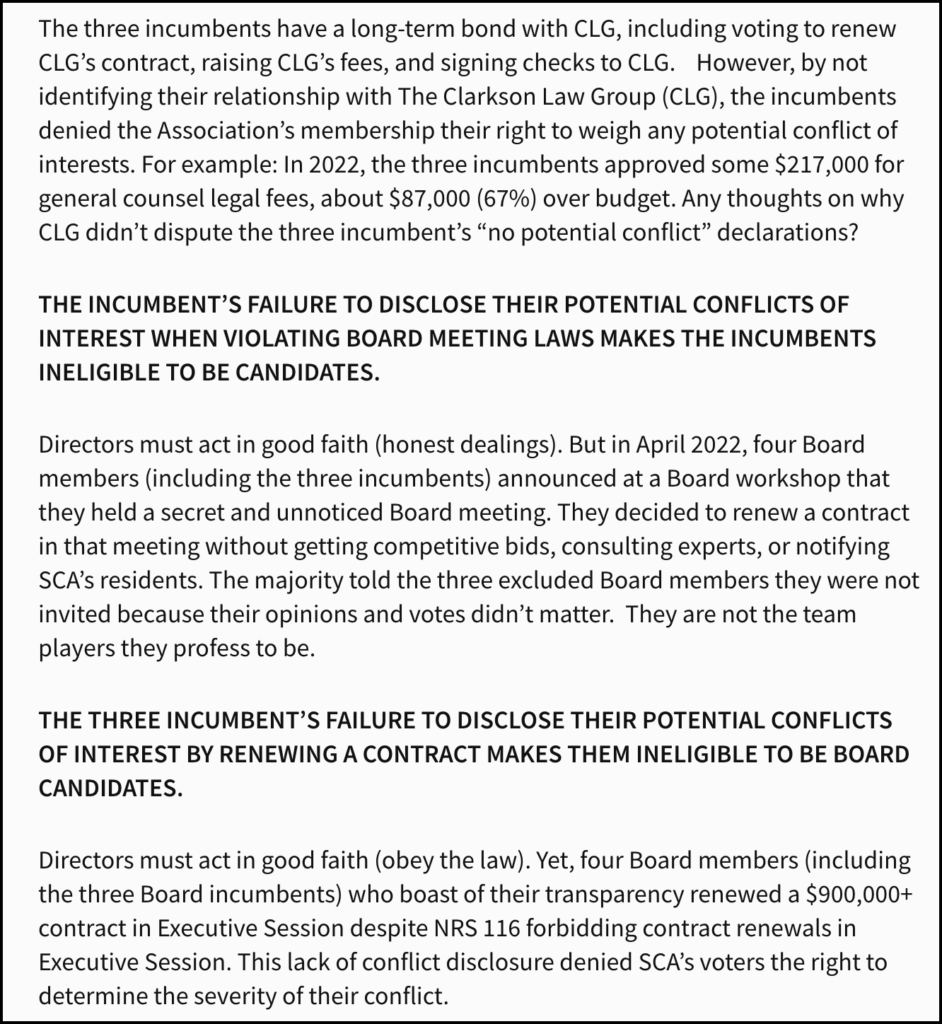
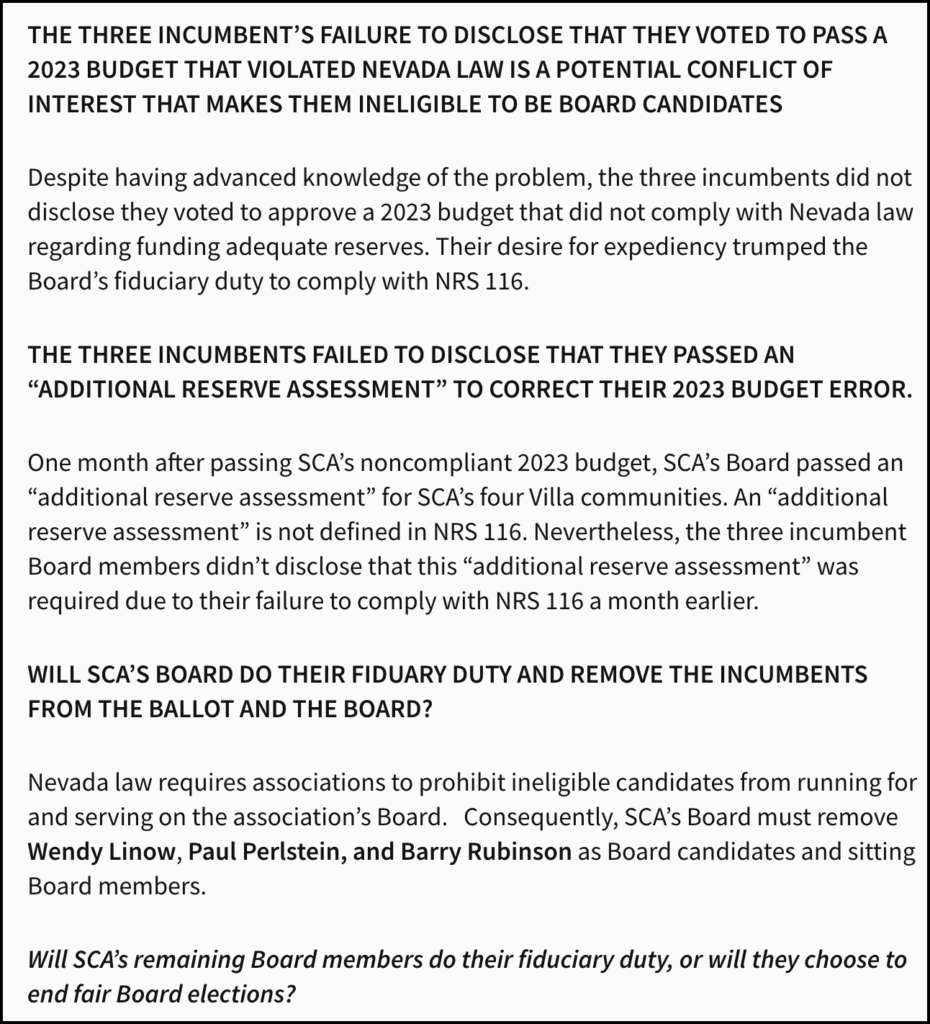
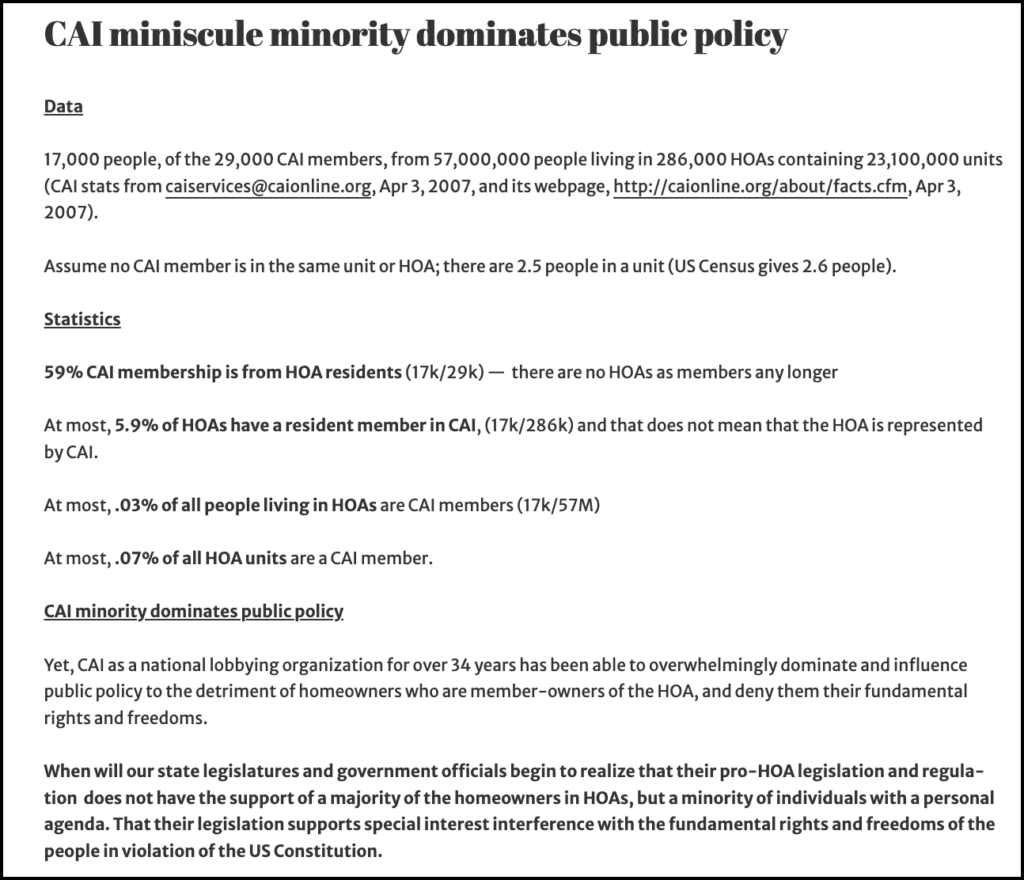
3/28/23 The court declared that my filings requesting written finding of attorney misconduct be forwarded to the State Bar against HOA, debt collector, real estate speculator and bank attorneys were vexatious and so I am prohibited from filing any civil action against any defendant for any cause of action until I get approval from the Chief Judge.
4/26/23 I filed a motion to disqualify the judge and set aside the order. There will be a hearing on 5/25/23 @ 10 AM
What benefit does a lack of transparency give to anyone other than overpaid managers and attorneys? Why, if the HOA exists for the benefit of the owners, does adding a charge to the owners to provide information in email or electronic format make sense?
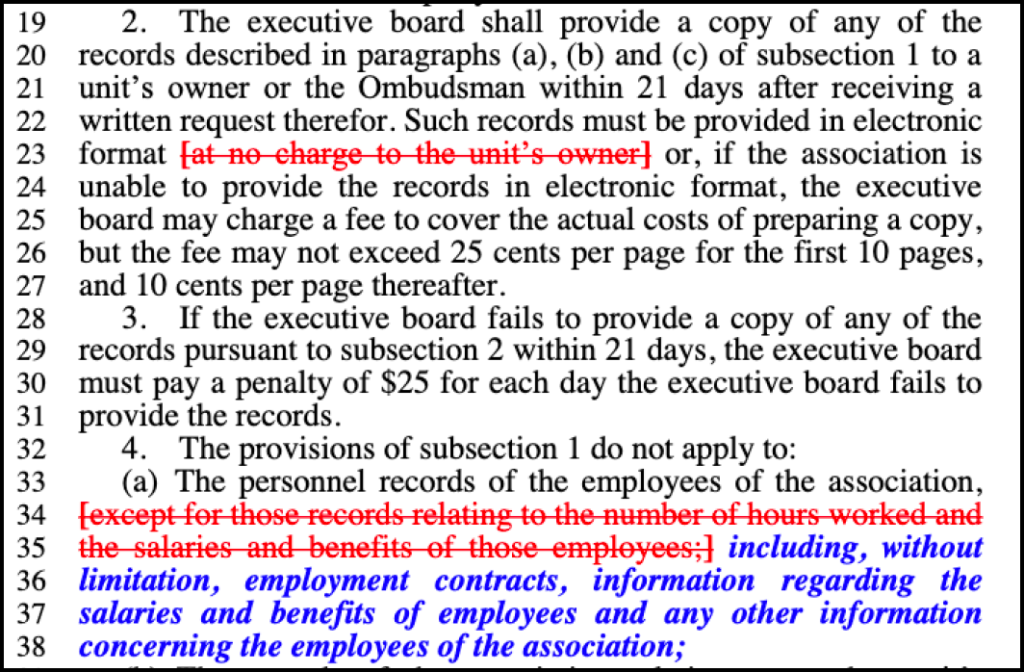
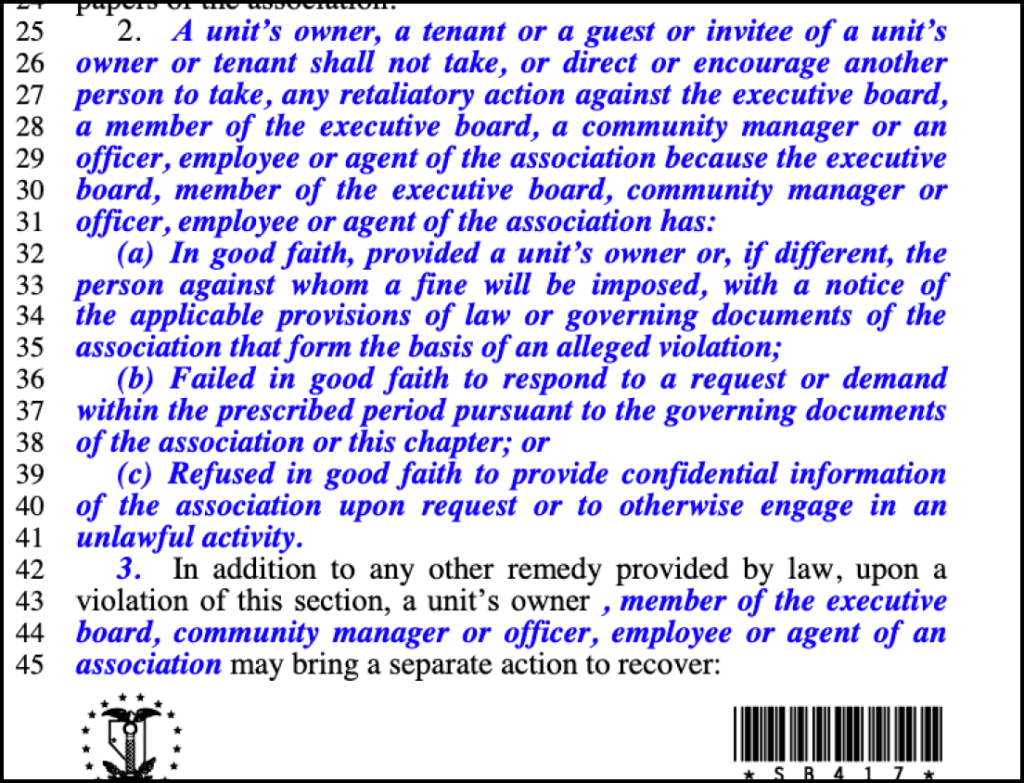
Why is this written only in one direction? Why isn’t’ it written to be bilateral? Why isn’t the attorney, manager of Board member prohibited from retaliating against anybody?


My name is Mike Kosor. I strongly oppose SB 417. I serve as one of only two elected directors on mydeclarant controlled Master Board of a nearly 9,000 units community.
Senators, we should be seeking to ADVANCE board transparency, especially where boards are declarantcontrolled, and ENCOURAGE greater participation of owners in their HOAs. THIS BILL DOES THE OPPOSITE.
Prohibitions on defamatory statement is appropriate and long a violation of NRS. But as written, this bill (sec 2 & 3) will allow the association to determine what they consider defamatory and ultimatelyprovide the association the ability to censor free speech based on opposing positions from that of theboard (or declarant when appropriate). This section of NRS 116 was intended (in 2013 when added) toprovide the Division and Commission powers to protect homeowners from bulling, “out of control” HOAcorporate boards and management companies. Existing civil laws dealt with owner misconduct- amisdemeanor. What is now proposed creates as new crime and flips the protection on its head. It is anassault on First Amendment rights, an end-run of Nev anti-SLAPP laws, and generally works to chillowner opposition to the governance of their communities- not to mention a rainmaker for attorneys and management companies.
We have association attorneys routinely writing cease and desist letters to homeowners based onopposition to board actions made in person and/or on social media, most all of which are baseless and used simply to intimidate. They do not file litigation because 1) a vote of owners is righty required andmore importantly, 2) most all actions would be thrown out as baseless. But the threat of action -baseless or not- is the chilling element. If they could, as this bill attempts to permit, side-stepping theowner vote requirement or by using proxies, the chilling effect would be extensive and immediate – using the purse of owners.
I have been a victim of a defamation action- the first legal action of my life (Olympia v Kosor). It was 5years, A Neveda Supreme Court ruling, and nearly 7 figures in attorney fees, even when invoking Nevada’s anti-SLAPP law. While the developer lost its battle with me (the Court finding the action “quintessential SLAPP”), the developer and his appointed board won the war. My neighbors dare not benext. But they did subsequently elect me to represent them. I am a retired USAF Colonel and fighter pilot, with combat experience in the first Gulf War. This experience, defending the attacks by thisdeveloper on my family’s financial future, was in total the most stressful experience of my life.
I am uncertain as to the viability of the Division (or Commission) protecting the fundamental right of free speech and to perform the needed due process of law, censorship of communications in social media,work place violence, civil disobedience, etc., this bill could levy on it. Do you really want the Division orvolunteer directors susceptible to the influence of mangers and declarants involved here?
A second anti-transparency effort of the bill is it seeks to charge “actual” cost to inspect documents. Allcommunity managers are paid to provide the record keeping services for the association as part of theirbase fee. Any cost incurred in providing that service they are already made whole. Sec 1 of this billallowing for the “actual” (undefined and arbitrary) payment, is a doubling of the payment. It is inconsistent with other regulated charging for record inspections, will demand even moreassociation policies, and is totally inappropriate. This is simply, at best, a windfall subsidy to communitymanagers at the expense of the homeowners with a right to access community records. Ormore likely, it provides an ugly tool for association or managing agents so inclined to use cost barriers to chill transparency.
Sec 4 weaponizes the NRED complaint process to remove and ban “abusers” for up to 10 years fromserving on a board for a little as filing a “misleading” complaint (among other not well-defined offenses).
If “misleading” was a punishable standard for attorney’s filing civil litigation, we would most likely have a server shortage of litigators. In any case, in comparison, a convict out of probations can run for public office after only 4 years.
Sec 5 phrasing is nonsensical and adds ambiguity. An allegation of a violation is by definition a violationunder the condition of the hypothesis -“assuming it is true”. It would add an extra step to the complaint process and would take an already flawed complaint process, where the Division is not accountable forits decisions. It would make the process even more opaque, permitting a case closure at the outset before the Ombudsman is involved. Denying owners accesses to a Commission hearing leaves owners no recourse but costly litigation, where deep pockets and “influencers” have a huge advantage.
Lastly, had the CIC Task Force, specifically enacted by 2019 legislation to better bring HOAlaw changes for approval, been used as intended (not completely void for over 2 1/2 years) much if not all could have been avoided.
This is a bad bill all around. Please, do not pass.
Michael Kosor, Colonel, USAF Ret.Director, Southern Highlands Community AssociationMikekosor.com
Bob Burch abruptly resigned last week,
…for reasons which will not be revealed, Rex Weddle announced to owners, or at least, to the 850 owners who have opted-in to receive SCA eblasts.
Rex also said that the Board would be appointing someone to fill Bob’s seat until the next election (May 2019).
Surprisingly, Rex then invited owners to submit their names for consideration by next Friday, July 13 @ 5 PM to the GM at [email protected].
If you are interested in being considered by the Board of Directors for appointment to a position on the Board, please be sure to place your written request to General Manager, Sandy Seddon, no later than end of business on Friday, July 13, 2018. Click Sandy Seddon to submit via email. This correspondence should include your name, phone number and a brief statement as to why you feel you should be considered to serve on the Sun City Anthem Board of Directors.
Once the Board votes on this appointment, they will also vote on the re-organization of the Board and select its officers.
It should come as no surprise that, although the SCA governance and Board elections are structured to be completely non-partisan, there is a clear demarcation between factions in our community that might be identified as:
If there is any hope in healing this community’s divide, there needs to be a shift in the representation on the Board to include voices from all three groups.
Otherwise, the currently-entrenched group-think will continue to dominate our public discourse and distort governance so all residents are not equally well served.
I, for one, do not think this dynamic is healthy for the community. At a minimum, it has reduced my own joie de vivre, and I don’t think it is a stretch to say that I speak for others.
If you feel that you have a perspective that would assist the Board to be more effective at representing the entire community rather than just the segment whose voices are now heard, please step up.
Because that’s not the way they did it last time. Jim Coleman was appointed last September by a secret process that
The Board kept secret how Jim Coleman had been recruited and what competitive process, if any, had been employed. They were also silent as to where the Board got the authority to fill the seat of a director who had been removed when the NRS and the bylaws required a membership vote.
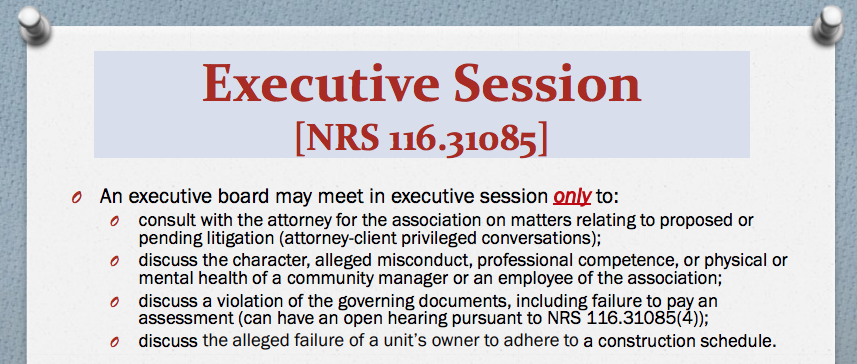
One has to wonder what motivated this 180-degree turn to a more open, competitive process to fill a vacated Board seat.
And, I’m sure, the more cynical among us, will question how open this current process really will be.
I have been dealing with other things this past month, and had not kept up with the last month of the two-year restaurant process. I had heard that the negotiations had broken down with the one vendor left standing.
So, I went into the Board meeting thinking that the deal with G2G was off the table.
When I sat down, an irritated resident told me the Board was still negotiating a sweetheart deal with G2G.
I was further confused when I opened my computer and saw that at 1:13 PM, literally minutes before the 1:30 PM meeting, palace-favorite, blogger Berman published a letter G2G sent to the GM saying that the deal was off, no matter how big the subsidy.
And here’s the kicker – it’s all Dick Arendt’s fault that G2G pulled out because he talked bad about them on Anthem Opinions.
It is inappropriate, from my perspective, for the GM and the Board to have a death grip on information which should be openly and immediately shared.
But it’s worse when they blatantly give David Berman “scoops” because they can count on him to consistently write favorably about the GM and the Board – NO MATTER WHAT – and unfavorably about other bloggers who won’t give the Board or the GM a free pass when they screw something up or screw someone over.
If it is confidential, it is confidential from everybody. If it is not confidential, it should be made readily available for the easiest possible access. The GM and the Board are creating a huge amount of unnecessary conflict by the way they mis-handle communications.
The GM and the Board play favorites and do not uniformly enforce the rules of confidentiality. They use information as power, and block access from their detractors. When criticized for this failure, they go crazy, and threaten the owners, particularly bloggers, who out them.
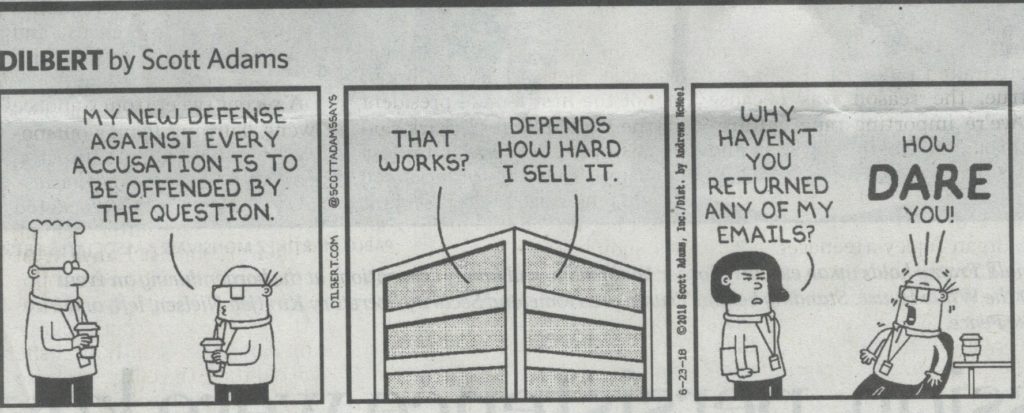
Apparently, free rent, free utilities, and ZERO profit-sharing with SCA until the obviously-unattainable $1.4 million revenue number was reached was not a sufficient subsidy to overcome the damage done by the bad-mouthing of the non-Berman blogger.
The GM did not quote the entire G2G “we’re outta here” letter with those attending the Board meeting that she unfairly shared with David Berman before the meeting.
I say “unfairly” because it allowed her to use a willing tool to illegitimately stoke the fires of animosity AGAIN against their common nemesis, and his reviled, competing blogger, without her having to dirty her hands.
Anyone else who requested such a document would have been threatened with sanctions for even asking for it, and then had to swear on the head of her newborn grandchild that it would not be disclosed before it would have been handed over.
She did, however, in making her report, focus on the phrase in the letter that most effectively, albeit unfairly, shifted the blame away from her, and her own gargantuan part, in designing an RFP/negotiation process ensured to fail.
She said that the SCA-G2G negotiations had reached impasse over “drop and go’s”, alcohol and pot lucks,
The Board wanted to talk some more, and SCA’s team thought they could get a deal, but G2G wrote her today that it is no longer interested. She paraphrased this part of the pull-out letter.
“… the blogging of Dick Arendt and his call to boycott the restaurant even before we opened.
So, …(we’re withdrawing due to)… the poisonous atmosphere illegitimately manufactured by a blogger.” G2G
What’s the bottom line?
The Board approved a motion to direct management to continue to look for a restaurant tenant.
The GM asked the Board to approve two Board members to work with her. Tom Nissen is now fully retired from the Board and not willing to serve as a non-Director member of the work group. No matter how many times this method has failed (using a couple of Board members with the GM instead of an independent, specialized expert), hope springs eternal.
The good news is Gary Lee, the Director I think has the most experience negotiating restaurant contracts, was appointed to the team.
The bad news is that, to get a successful restaurant, Gary Lee will probably have to do a lot of the GMs job. The GM has not demonstrated herself capable of getting a successful restaurant tenant in place since she got here in November 2015 – even through that expectation was the one specific criterion the Board adopted – and probably ignored – for her 2017 bonus.
One owner had specific suggestions about how to economically poll owners about whether they want a restaurant at all, and encouraged the Board to look at the possibility of just a bar and appetizers. There were suggestions for the Board to take a broader view of what would work in that space, including a food court or the high quality of places he had seen in Asia.
The old guard continued to promote the idea that only people who show up at meetings should get a voice, but I got the sense there was a small crack opening in Board acceptance of the idea that other people need to be heard.
Several Directors said they were disappointed to be back at square one, but had an interest in getting more owner input. They saw the need for improving the RFP process to more clearly spell out the parameters in advance and to be open to wider competition.
Several Directors unfairly blamed bloggers, particularly Dick Arendt, for G2G pulling out, just as other Directors have voiced this same unfortunate refrain to deflect criticism of previous Board decisions that weren’t particularly owner-friendly.
“Shut up. We’re in charge here.”
They again asserted that the Board should take legal action to stop the criticisms of the Board and management that they think are totally unwarranted.
It’s a weird perspective to me – this being America and all. Utterly lacking in a sense of what gives legitimacy to their power
“Governments are instituted …deriving their just powers from the consent of the governed.”
-the Declaration of independence
I am particularly saddened when I hear Art and Jim rant about the need to silence dissent. I like them both, on a personal level, and think they are good people.
I think they just are not getting how they are unwittingly contributing to the polarization of the community by representing only some of the people, and by not tolerating diversity of opinion about the way we want to be self-governed.
To self-righteous and aggressively defend themselves and those who agree with them against perceived injustices only becomes dysfunctional when that outrage is used as justification for intolerance and threatening to use legal force to stop the free expression of dissent.

Justice delayed is justice denied
The length of time NRED has taken to address the complaints I submitted last September without response has unfairly diminished their credibility or, in some cases, rendered them moot.
This is unacceptable, particularly since these issues (election interference, concealing association documents, retaliation, harassment, unlawful removal from the Board for essentially political purposes are all issues of great import to protect homeowners in all Nevada HOAs.
Denial “without prejudice” in one election interference case was nonsensical. A 10/20/17 complaint that Bob Burch was wrongly left off the removal election ballot because two pages with a combined total of 22 signatures mysteriously disappeared so allegedly, he was two signatures short of being placed on the ballot. On 12/11/17 the complainant (not me) was notified by Christina Pitch that the case was closed stating: Say, what?
Say, what?
Claiming that the Ombudsman’s attendance at the vote count of the ballots (ballots that did not include Bob Burch) was sufficient justification to deny the complaint that Bob Burch’s name was wrongly excluded from the ballot (due to 22 missing signatures) is a complete non sequitur.
Further, Bob Burch was treated as a non-conflicted Board member at the November 1 recall vote count despite the complaint about his not being included on the ballot was still open until NRED’s December 11 rejection.
To say that this was not prejudicial to the claimant (meaning that he could file the complaint again after the point was moot) adds insult to injury.
Those same 11/1/17 recall vote count owner meeting minutes show the tip of the iceberg of the completely inappropriate role Adam Clarkson took in the recall election process.
Not only was there no Board approval:
There is substantial additional evidence that Clarkson unlawfully acts as a decision-maker, or as the GM’s attorney, rather than solely as a legal advisor to the full Board.
GM’s concealing association records and using the attorney to threaten owners for even asking appears to be condoned by NRED.
NRED gave two different responses to the draconian records request form revised by the Clarkson law group 2/28/18 to suit the GM regardless of the law or best interests of the homeowners.
The first was an email response to a homeowner in March correctly stated the owner protections in the law,
“The “mandatory acknowledgement” form…is contrary to NRS 116, as such a document is not required by law.”

The second NRED response was only reported verbally.
I haven’t seen any written response from the Ombudsman to the SCA Board, but the Board President has reported that NRED approved the unlawful “acknowledgements” on the document request form that restrict the homeowner from sharing legally accessed material with third parties.
Could this really be true?
According to the Board, NRED has approved the SCA threatening homeowners that, if the information (released per NRS 116.31175) is disclosed to third parties, the owners may be subject to fines and penalties up to foreclosure.
These Clarkson-crafted “acknowledgements” are allegedly (according to Clarkson) binding even if the owner does not sign or agree. According to SCA, NRED says this is okay, just so long as the owner is not required to sign the acknowledgement.
Does NRED have a double standard?
Note that the document request form’s revision was not approved by an official Board action despite the requirement of SCA bylaws 6.4(a)(b) p. 24.)
The Board abdicated its duty to make records accessible to owners contrary to NRS 116.31175, and the GM never signed a management agreement acknowledgement per NRS 116A.620(1)(a)and (m) that the HOA records do not belong to the manager.
Yet, NRED apparently issued a verbal ruling giving the SCA Board and management carte blanche to carry on.
Could this really be true?
And one last thing
Lack of transparency allows SCA homeowners to be put at risk due to
My insistence in attempting to address these problems led to the harassment and retaliation that was the true impetus of my removal from the Board.
Note that NRED has not responded to my 7/21/17 Form 781 complaint other than to refer it to the investigations division. The problems of withholding and concealing records have been exacerbated over the past year, and I have submitted additional documentation to the complaints in September, November and January evidencing this unacceptable pattern.

Tomorrow, I’ll see what NRED Chief Investigator’s perspective is on the 6/6/18 email I am sharing below in Part 2 “Secret meetings”, in the previous blog, “Why so quiet?“, and in the final part 3, “In case you don’t think this is enough evidence”
The second complaint was that the Board deliberates in secret meetings. This complaint being dismissed perfunctorily is also problematic. It appears as if NRED condones a pervasive pattern at SCA of decisions being made by the Board, the attorney, the GM or individual directors without proper action by the Board in open session.
It also appears that there are no consequences if SCA Board is not compliant with NRS 116.31083, NRS 116.31085, or SCA governing documents.
Previous NRED officials have issued letters of instruction (attached to previous email) to require statutory conformance (with owner protection laws) which SCA now ignores.
I, as well as other SCA residents, have alleged that, currently, many Board decisions are made improperly, i.e.,
Obviously, the SCA Board was notified that SCA has won by default, but apparently the owner who complained was not.
As Bob Burch said,
Both complaints were closed without any action being taken against the Association when the division determined that there was no good cause to continue with the investigation. In other words, we prevailed.
Is that NRED’s intent?
NRED needs to be aware that at SCA, Board decisions are routinely made by the GM or attorney in policy areas in which the Board is prohibited from delegating by SCA bylaws 3.20 and 3.18 pursuant to NRS 116.3106(1)(d).
These wrong parties (the GM, the attorney, a subset of the Board) falsely claim the Board made decisions that the Board didn’t make correctly, or worse, didn’t make at all, e.g.,
Here is a link to a www.SCAstrong.com blog, “If they had only known, part 3” that gives some examples of GM decisions that resulted in election interference, hiring bankrupt or conflicted debt collectors without due diligence or following proper procedure, a biased selection of a restaurant vendor (that is not proceeding for unknown reasons, leaving SCA with no restaurant for 2 1/2+ years and counting).
I can also provide you links to the actual documents that are are evidence of these and other specific incidences if NRED needs more documentation to make a finding and prohibit agents from taking advantage of SCA.